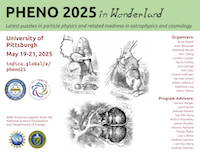Speaker
Description
This work presents advancements in model-agnostic searches for new physics at the Large Hadron Collider (LHC) through the application of event-based anomaly detection techniques utilizing unsupervised machine learning. We discuss the advantages of Anomaly detection approach, as demonstrated in recent ATLAS analysis, and introduce ADFilter, a web-based tool designed to process collision events using autoencoders based on deep unsupervised neural networks. ADFilter calculates loss distributions for input events, aiding in determining the degree to which events can be considered anomalous. Real-life examples are provided to demonstrate how the tool can be used to reinterpret existing LHC results, with the goal of significantly improving exclusion limits. Furthermore, we present a comparative study between anomaly detection and supervised machine learning techniques, using the search for heavy resonances decaying into two or more Higgs bosons as a representative case to demonstrate the application and effectiveness of these methods.

